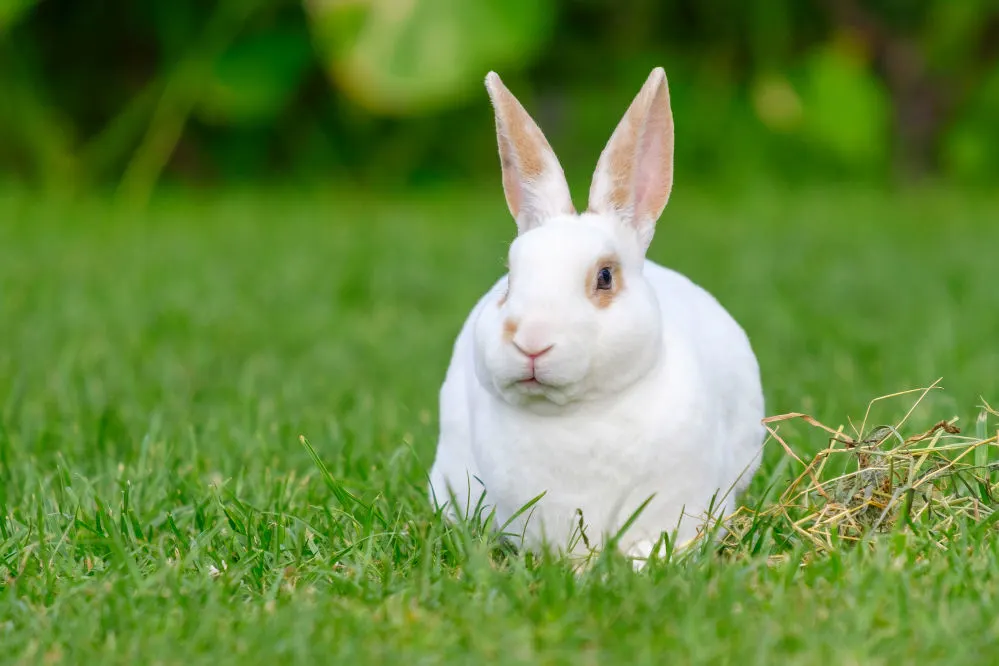Rabbits are adorable little creatures that happen to never get full. You heard that right. These furry animals can munch away all day, which is why they’re classified as grazers.
Knowing this, introducing new foods to their diet would be a great option — allowing you to offer them a wide array of veggies and fruits.
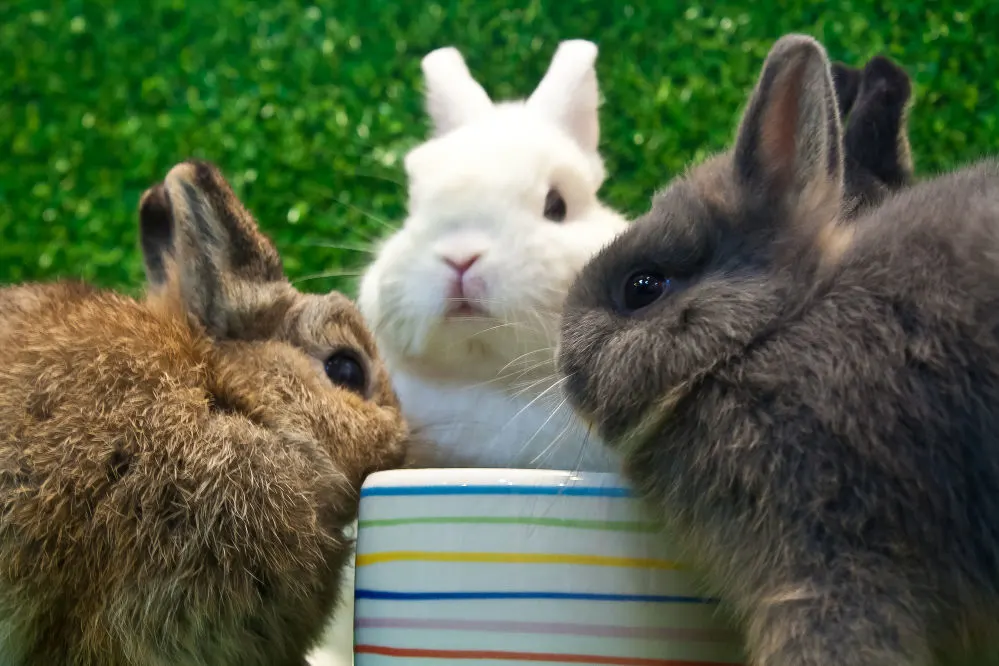
Can rabbits eat cauliflower, though?
This post will cover the dos, don’ts, benefits, and risks, so read on to learn everything you need to know about feeding your pet rabbit cauliflower.
Alright, let’s get into the nitty-gritty details of this delicious superfood.
PS: You might also want to know if rabbits can eat mangos.
Can rabbits eat cauliflower?
Cauliflower consists of tightly bunched florets (usually white) surrounded by dark leaves. It forms part of the brassica family, which includes broccoli, Brussels sprouts, cabbage, cauliflower, collard greens, kale, and turnips. Also known as cruciferous vegetables, these edible crops have substances that can help fight against cancer.
As mentioned before, cauliflower is a superfood packed with different nutrients, so it should make the ideal healthy snack for a rabbit, right? Surprisingly, that’s not the case. Cauliflower causes too much bloating in rabbits, making them extremely gassy.
While that doesn’t sound like good news, it does not mean you can’t feed a rabbit cauliflower at all. Instead, see it as a small addition to the handful of fresh veggies you provide your pet bunny daily. You’d want to give your furry pal a medley of leafy greens, root vegetables, and their high-fiber, fresh hay to ensure a balanced diet.
The most important thing to note is that if your rabbits eat cauliflower in moderation, it should be safe for them.
So, if you’d like to add small pieces of cauliflower to your bun-bun’s veggie bowl, it’s time to learn about the parts of cauliflower they should eat.
Cauliflower leaves
Rabbits are able to digest cauliflower leaves. Since most people discard these after using the florets anyway, it would be a good idea to chop them up and feed them to your furry friend.
Cauliflower stalks
The stems can also be thrown into your bunny’s diet; they won’t say no to these.
Read Next: Can rabbits eat strawberry tops?
Cauliflower florets
Rabbits can eat the whole cauliflower, including the white or yellow bits. Some would prefer the leaves or stems, but there’s no need to worry about which part they should eat.
Note: Don’t be alarmed if you notice that your rabbit prefers one part of a cauliflower over another. This further proves how, like us, these furballs have their own taste and preferences!
Purple cauliflower
There’s not much difference between purple and white cauliflower, with both containing the same amount of vitamin C, protein, and carbohydrates. An antioxidant called Anthocyanin is what gives purple cauliflower its color.
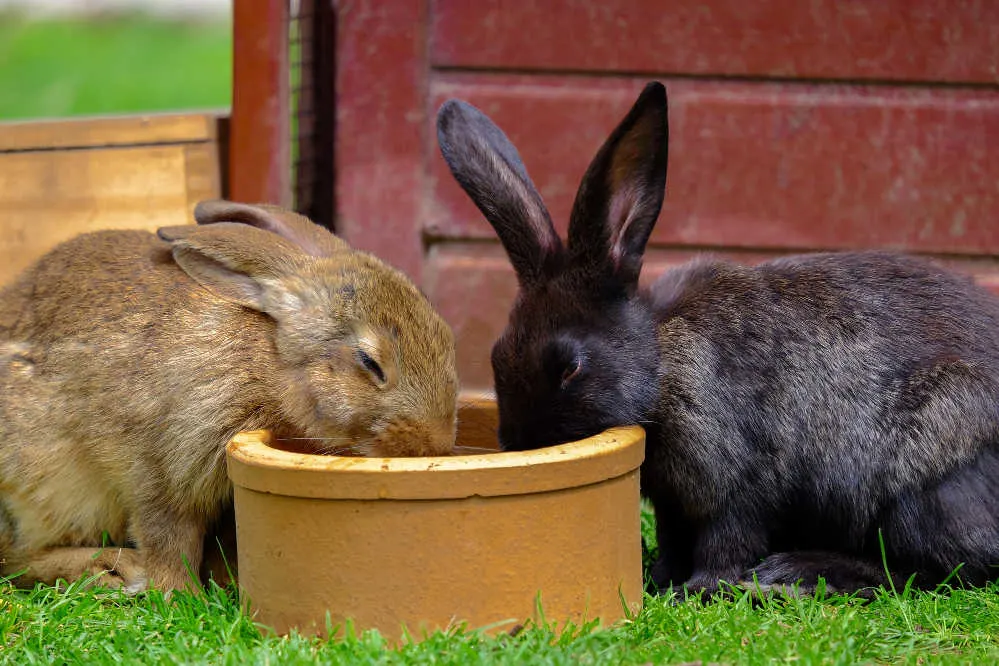
Animal studies show no toxic effect of this antioxidant, so it should be fine for bunnies, just like regular cauliflower.
Which part of the cauliflower is the best for an adult rabbit’s diet?
While rabbits can munch on the entire cauliflower, the leaves are the most suitable part for a balanced diet. Cauliflower leaves are packed with vitamin C and rich in antioxidants. Plus, your rabbit will find these lush leaves pretty delicious, making them a much healthier choice for them.
However, be aware of the high amount of calcium in cauliflower leaves, as excess amounts may lead to kidney stones in rabbits. A pro tip is to pair cauliflower leaves with vegetables containing low oxalic acid, such as parsley or kale.
Can rabbits eat cauliflower every day?
By now, you know that cauliflower and bun-bun tummies aren’t that compatible. So, you don’t want to make cauliflower part of their everyday diet. Doing this can damage your rabbit’s health, which we’ll cover below.
In fact, you should avoid feeding your rabbit any other vegetable in the brassica family daily due to digestive problems.
Why can’t rabbits eat cauliflower every day?
Most people think that rabbits can’t fart or burp due to never hearing this occur. That couldn’t be further from the truth, as they pass gas often since it’s essential for their digestive health.
However, certain foods can make bunnies more gassy and bloated than usual. Rabbits suffer from gas quite often, which can become fatal if ignored.
If you pick up any symptoms of gas, you need to get your bunny treated as soon as possible. These symptoms include a loud, gurgling tummy, grinding teeth, lethargy, and pushing the stomach against the floor.
Introducing cauliflower as an occasional treat in your rabbit’s diet
There are a few things to remember when introducing this tasty treat to your rabbits for the first time.
The following tips will help prevent digestive issues:
- It’s essential not to feed your pet cauliflower in addition to other high oxalic acid leafy vegetables.
- Cut your cauliflower into small quantities and provide it to your rabbit no more than two to three times per week.
- Rinse the cauliflower thoroughly with fresh water before serving it to your bunny.
- Only include cauliflower if your rabbit has a high-fiber diet with a good balance of grass hay (80% of their diet) and a variety of vegetables.
- Ensure your rabbit eats other fresh foods in combination with cauliflower.
- Introduce cauliflower slowly and in moderate amounts into your rabbit’s diet.
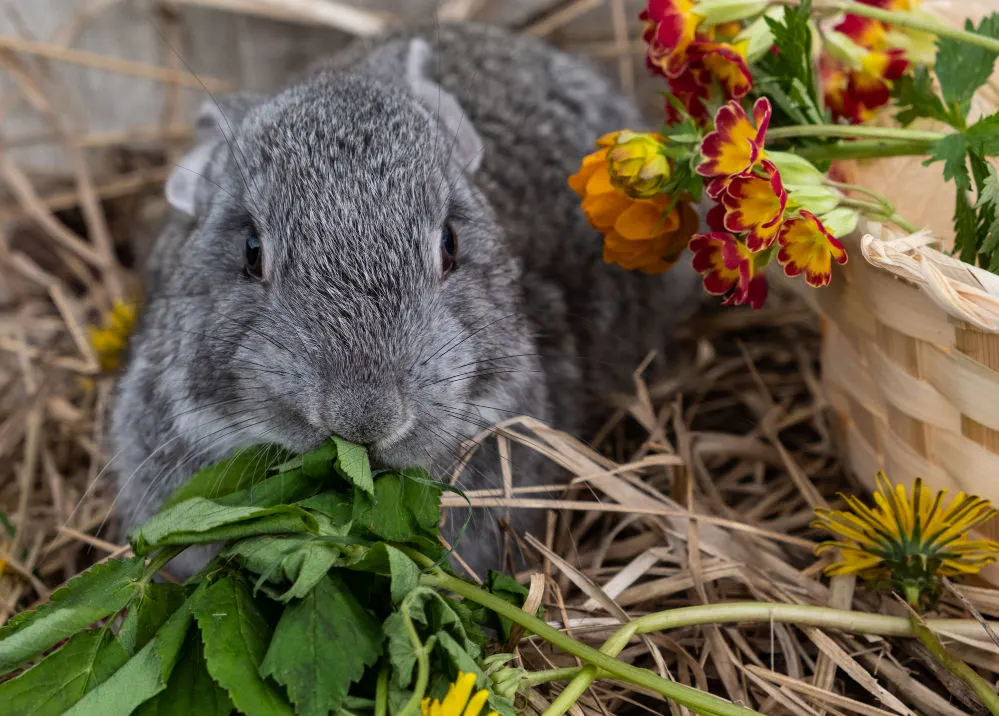
How much cauliflower should your rabbit have?
Ensure you give your bunny the right amount of cauliflower. One teaspoon per two pounds (0.9 kgs) of body weight is fine (try not to go over this amount per serving). While that will be the best way to determine the amount of cauliflower your pet needs, you won’t always have time to weigh your bunny.
An alternative is to give your bunny one handful of fresh vegetables daily. Add cauliflower every other day (two or three times per week) and alternate it with other nutritious foods.
Can I feed my baby rabbit cauliflower?
The short answer is no. Do not feed your younger rabbits and baby kits cauliflower. At these ages, they’ll be far too young to deal with the amount of gas buildup in their delicate digestive systems due to this vegetable.
Stick to other healthy vegetables that are safer for kits. In small portions, carrot tops, cilantro, parsley, spring greens, dandelion greens, and kale are far better options for baby rabbits, as they shouldn’t be eating cauliflower.
Read Next: Can rabbits eat squash?
Nutritional benefits of feeding your rabbit cauliflower
Let’s have a look at the health benefits of feeding your bunny cauliflower:
Aids in healthy bone growth
One essential nutrient in cauliflower is vitamin K which helps support healthy bone growth and blood clotting. This would be especially beneficial after a rabbit has suffered an injury.
Aids in digestion
This might sound contradictory, as cauliflower causes gas to build up in a bunny’s digestive system. However, if you give them the proper amount, as suggested above, you’ll find that this veggie will help your bunny’s gut maintain a smooth flow.
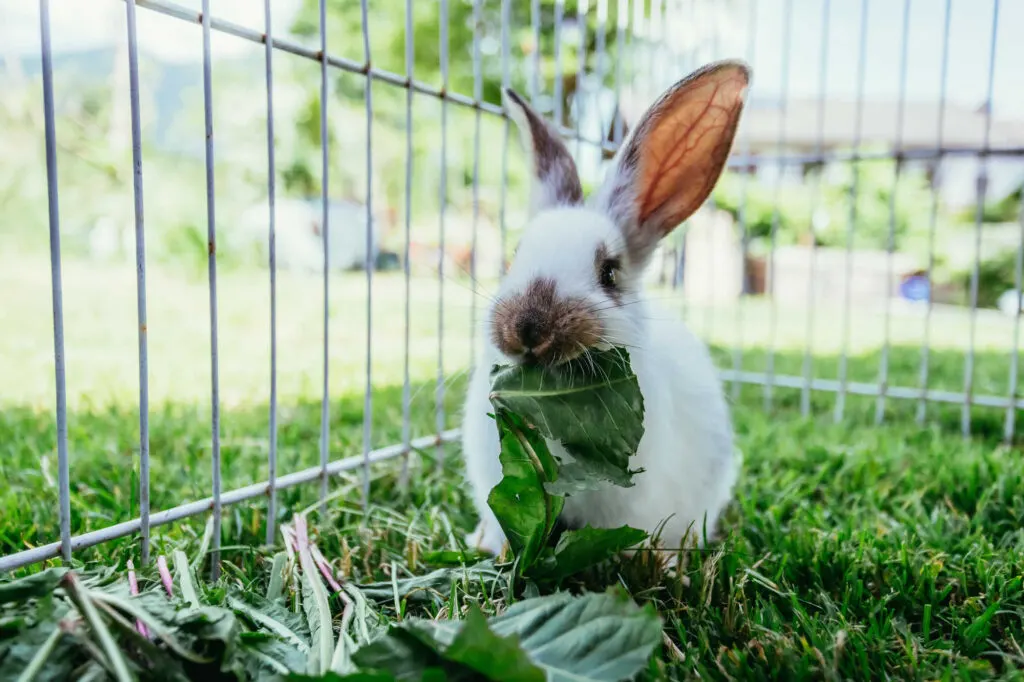
It’s possible thanks to the high water content (more than 90% water by weight) and dietary fiber in cauliflower.
Boosts the immune system
There are traces of essential vitamins and nutrients like vitamin C, selenium, and phytonutrients in cauliflower leaves that can boost a bunny’s immune system and overall health.
Health problems related to feeding your rabbit too much cauliflower
Although cauliflower has many health benefits, there are some potential risks if fed incorrectly to your pet. Let’s take a closer look at some of these health problems.
Gastrointestinal distress
The main risk or concern of overfeeding cauliflower is its negative impact on a rabbit’s digestive system. Apart from gas and bloating, constipation or diarrhea might become a huge problem if overfed.
Read Next: What does rabbit poop look like?
Should rabbits eat cauliflower? Wrapped up
Now that you have all the necessary information, will you start feeding your precious little bunny cauliflower? Rabbits can certainly eat cauliflower as part of a balanced diet. Just keep it occasional, in limited amounts, and all should be good to go.
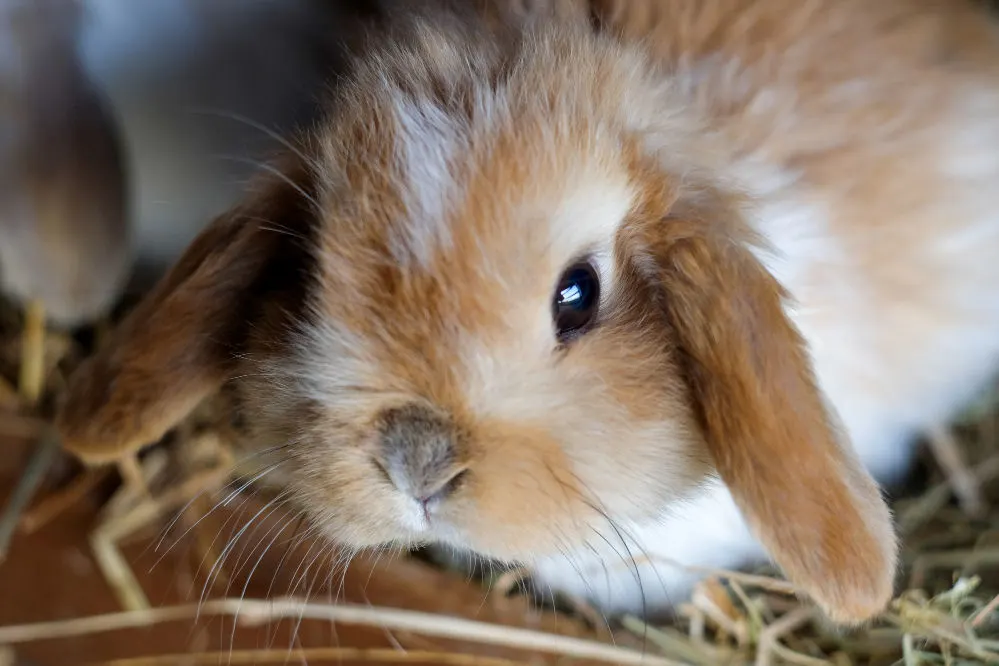
While this green contains a high amount of fiber, water, and nutrients, it may be better to opt for healthier alternatives like cilantro, kale, and spinach.
Next Read: Can rabbits have papaya?
Steph Dyson is a travel journalist by trade but a lover of all small pets. She’s been a pet mum to everything from gerbils to guinea pigs, rabbits to hamsters, and fish to dogs of all shapes and sizes. She wants to share her years of experience with small pets and make Small Pet Guides the go-to website for pet owners seeking information and care advice.

